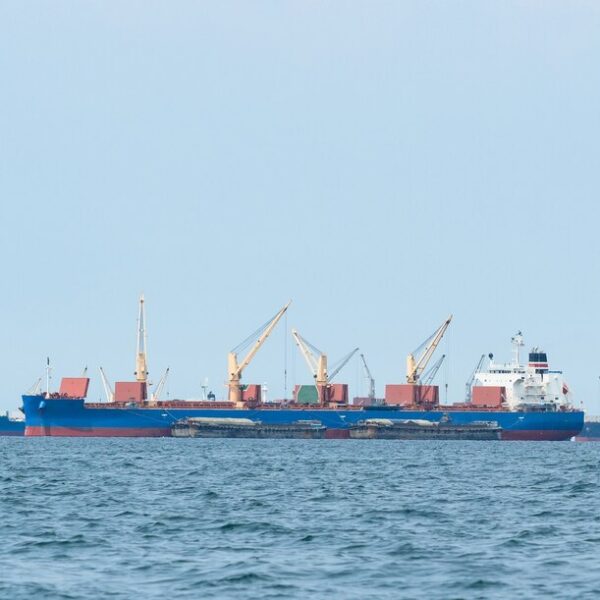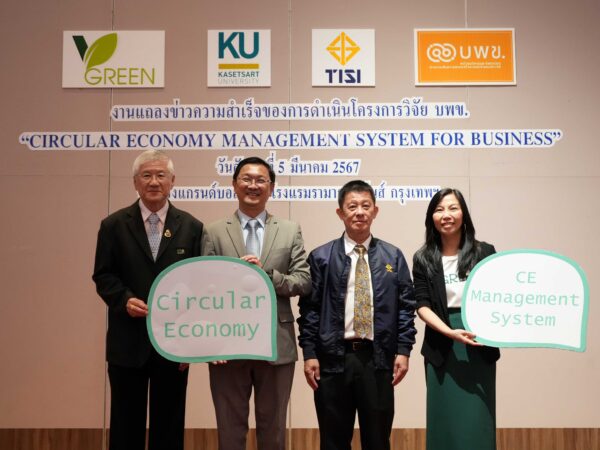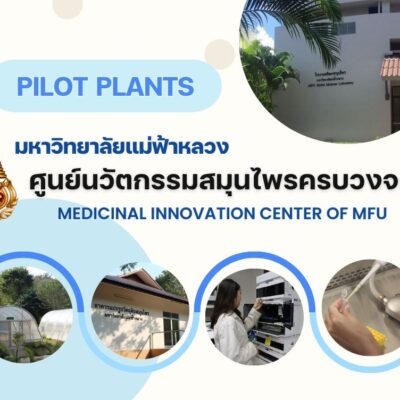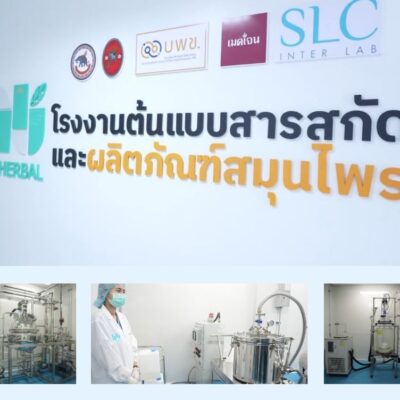Asst. Prof. Monchai Desangkranon, Ph.D., lecturer at Faculty of Science and Technology, Suan Dusit University, discusses the research project on innovative functional foods and nutraceuticals made from biomass left over from the extraction of C-phycocyanin of Spirulina, under the encouragement and funding from Program Management Unit for Competitiveness (PMUC), stated that on a large level, this research series is an attempt at answering the question of converting waste materials from production into valuable and commercially viable resources.
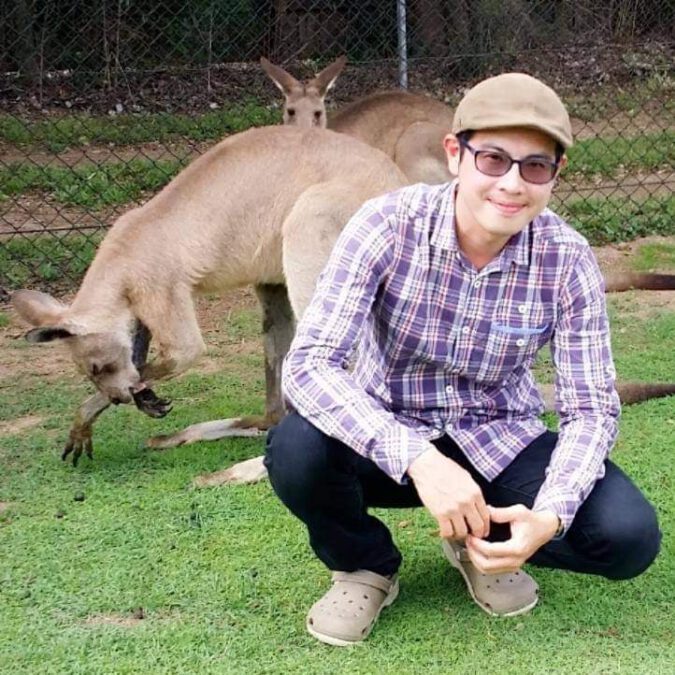
“Aside from teaching at the university, another part of the professor’s main work is in research. Therefore, we bring the existing knowledge to use in the development of food innovations, which is the distinctive identity of Suan Dusit University. By working with entrepreneur, My Healthy Food Co.,Ltd., which is a small spirulina factory located in Mae Wang District, Chiang Mai Province. The factory here has a suitable climate for spirulina cultivation, which is clean, safe and meets international quality standards, including GMP, HACCP and Halal. The spirulina grown here is dried and packaged in capsules for consumption as a dietary supplement. Part of spirulina will be put through an extraction process to obtain C-phycocyanin for use as food coloring and in cosmetic products. In the last step of the C-phycocyanin extraction process, spirulina biomass remains, which led to the research effort to further create added value.”
The findings of the research project showed that for each 100 g of dried spirulina, once the C-phycocyanin has been extracted, more than 50% of the spirulina biomass waste still remains, and retains many important biochemical constituents such as carbohydrates and proteins. C-Phycocyanin is considered a Phycobiliprotein which gives a blue color, with about 10-15 % of dry algae weight. It has water soluble and fluorescence properties. The industrial application of c-phycocyanin is mainly used in the food and cosmetics industries, including as a natural color to substitute for synthetic colors, as well as being used in medical applications.
“From the research, it was found that the biomass left over from the extraction of C-phycocyanin from Spirulina still contained polysaccharides and protein, which can be processed into high-value products. This is considered a research work that answers the problem of adding value to industrial waste. Because if you look at the overall industry, the factories certainly want to be Zero Waste, which means reducing waste from upstream to downstream and to have as little waste as possible remaining from various processes which need to be disposed of in the end.”
The research project consists of three sub-projects that share the same concept, which is the use of waste from raw materials, resulting from the extraction of phycocyanin, as a starting material for the development of various food innovations as follows:
Sub-project 1: Project name – Innovation from polysaccharide extract from biomass residual from C-phycocyanin extraction of Spirulina, and its application in functional food and nutraceutical products. It is an introduction of biomass remaining from the C-phycocyanin extraction of Spirulina, which was converted into polysaccharide powder to be used as an ingredient in dietary supplements
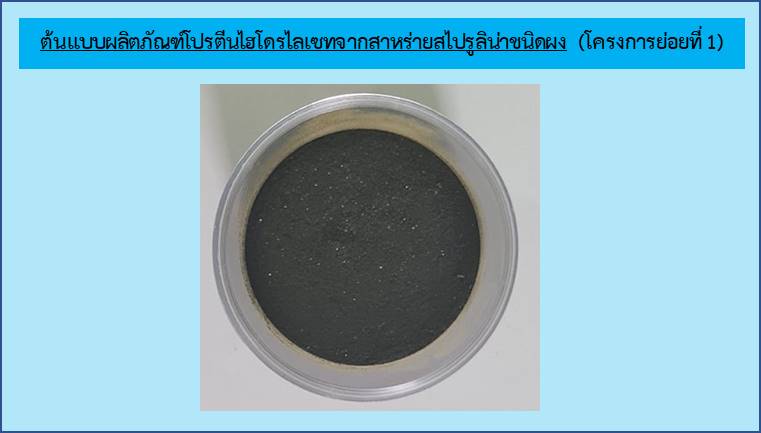
Sub-project 2: Project name – Innovation of a ready-to-drink hydrolyzed protein beverage for the elderly made from biomass left-over from C-phycocyanin extraction from Spirulina, which is a continuation of the first sub-project. After polysaccharide extraction, the researchers will use this residual product to develop hydrolyzed proteins, which are digested into short chain peptides for faster absorption. The end result is used as an ingredient in health food products for the elderly.
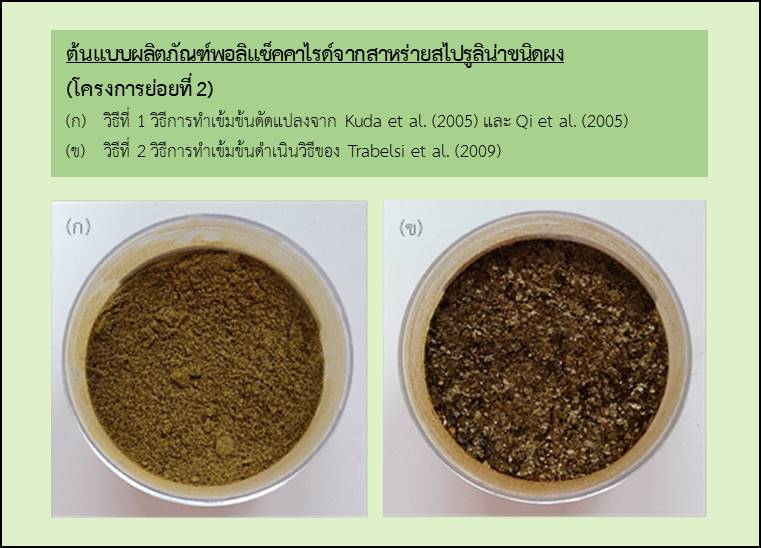
Sub-project 3: project name – an innovative, healthy bakery product made from biomass residuals from C-phycocyanin extraction of Spirulina algae, used as an ingredient in the production of 3 types of bakery products: bread, cake and cookies.
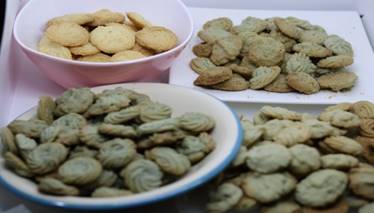
Asst. Prof. Dr.Monchai also added that currently, this research is a prototype functional ingredient with high value and commercial potential, providing opportunities for collaborative effort with entrepreneurs. It is considered a way to highlight the country’s outstanding innovations, leading to creating added value and solving the problem of leftovers by recycling and reuse, in effect creating additional revenue channels without causing environmental and societal problems.
“Working with entrepreneurs in this project was an opportunity to leverage the body of knowledge in biotechnology in solving the environmental problems caused by a lot of waste from the food industry. By expanding into high-value products with commercial potential, this also creates jobs for the local community, and creating food innovations as an alternative for consumers, as spirulina is an interesting source of protein. In the future, these research outputs will be brought to commercial scale, especially for health conscious consumers, which is a rising trend at present time.” concluded Asst. Prof. Dr. Monchai.


